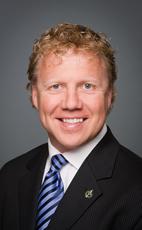Mr. Speaker, I want to thank you. I know that my words instill discussion, and sometimes pointed discussion, from the Liberal Party over to the Conservative Party.
Let me repeat that, 23 years later, we finally have a Liberal Party that has said that maybe the national child care program is not going to work for them. However, what seems to be working for the Conservatives is actually listening to what families say, asking families to take the money that is theirs—which was paid to the federal government—and giving it back to them to use for their children.
In economic action plan 2015, we have introduced an opportunity for an additional $60 per month for every child from birth until 6 years of age, to receive $160 per month. Every child between the ages of 6 and 17 is now eligible for an additional $60 a month. We are growing a plan based on the fact that we now have additional revenue that has put us into a balanced budget position and has enabled us to tell families that they can have a little bit more of the money back that they paid to the federal government. What is more, they have it specifically to use for the children who are in their care, whom they brought into this world.
It seems to me that even the Liberal Party of Canada said, “Wow, these guys have figured out how to deal with families across this country”. They will try to have some sort of plan—although has a $2 billion hole in it—that maybe comes at least within striking distance of what the Conservatives are offering.
I will tell members something. Families across this country are seeing something interesting, which is a government trusting families with how they use that money for their children. Even some of the parties in opposition are starting to wonder whether that plan is something they should be endorsing and copying. I guess that is the most sincere form of flattery.
We have also increased by $1,000 the maximum amounts that can be claimed against child care expense deductions. That is an additional $1,000 for the purchase of child care. We have now increased it by $1,000 to allow families to keep some more of the money that they pay. We have also introduced the family tax cut, which is a tax credit of up to $2,000 for couples with children under the age of 18.
We said in 2011, during the campaign, that we would look to family income splitting. We introduced it in 2006-07 for seniors to split their income so they could keep more of their hard-earned pension dollars to be able to stay in their homes, live within their means, and have a little bit extra on a monthly basis to afford what they needed. We have taken that to the extent of being able to say that, yes, a form of income splitting is going to be introduced in the 2015 economic action plan. That is a tax credit of up to $2,000 per family.
We have also increased the child fitness tax credit. It is $1,000, which was made retroactive to 2014, and the credit is now refundable. Again, that is something that happened in 2006. We offered help to families across this country who were in need of some additional revenue. We offered help to families in need of a tax credit, at least, that allowed them to get their children into programs that would give them the ability to begin fitness, to stay in that vein to ensure that their health is better, to help them stay in shape, and to learn that as a way of life through their older years. Now, we have grown that to ensure that the cost for families to put their children in sports and fitness events is tax deductible.
Back in 2008, we also introduced the tax-free savings account, for the 2009 budget. It was introduced as a $5,000 amount. Individuals across this country over the age of 18 could deposit some savings into those accounts, and the interest earned on those accounts would never be taxed by the federal government.
We increased that in a subsequent budget, and we made a commitment to double it by the time we had reached the 2015-16 budget. We are now going to pass a budget that includes a maximum of $10,000 per year that can be contributed to one's tax-free savings account.
I have heard all of the rhetoric from across the way about who is going to benefit from this program the most. We need to look at how this has been implemented and how it has worked over the last number of years. If we go to page 233 of this budget, we see the tax-free savings account is a popular means of savings for Canadians at all income levels. Individuals with annual incomes of less than $80,000 accounted for more than 80% of all TFSA holders and about 75% of tax-free savings account assets at the end of 2013. About half of the TFSA holders had annual incomes of less than $42,000.
The folk arts multicultural celebration just took place in my community in the last two weeks of May, the longest-running folk arts festival in the country. On three separate occasions, individuals approached me to talk about this specific policy and said, “Rick, you don't know and understand. I'm not someone who earns $100,000 or $150,000 a year”. All three of them told me they make less than $60,000 a year and appreciate the fact that they can actually save for themselves and their futures without having to pay tax.
That is a way to help Canadians. It is a way that we have put in our budget. It is a budget that makes sense and a budget that should be supported.

